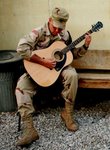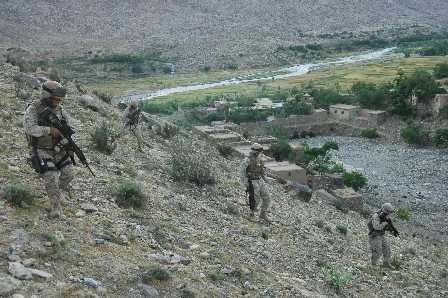Sunday, September 09, 2007
Took the Summer Off
Wednesday, June 13, 2007
SCHWACKING AFGHAN COPS - CRAZY AS JACK
LINK: http://www.boston.com/news/world/middleeast/articles/2007/06/13/mistaken_ids_lead_to_deadly_gunfight/
The Afghan cops were at remote check post in Nangarhar province – which is the end of the god damned earth, really. They thought the US troops were Taliban. The US troops apparently thought the Afghan cops were the bad guys – fog of war, miscommunication, happens all the time.
When the local cop, one who survived tell the Associated Press he’s “very angry,” and that he and his lazy-ass, barely professional thugs in uniform are “here to protect the Afghan government and help serve the Afghan government, but the Americans have come to kill us." – well, that’s good news for the real Taliban, who are no doubt trying to capitalize on this for their propaganda machine.
Shut up Mr. Mohammad, you wanna-be cop. You wouldn’t even have a job or pay if it were not for America. War sucks and this is a war. It sucks that some US helicopter rockets bombed your buddies. But you don’t really have the right to say that you are the protectors of the Afghan government – not when Americans have been dying in your country for the past 5 years to prop up the fledgling Afghan government. Of course, dumb – stupid NATO public affairs officers on the “island of Kabul” they have no information. The “other” U.S.-led coalition spokesman said he was looking into the report. So, basically, put your head in the sand – don’t give the reporters anything resembling the truth – and wait it out – because the “coalition” is getting hammered for killing the wrong people these days, too many civilian deaths and now Afghan cops.
On Monday, our guys shot up a car full of civilians in Kunar province, nearby. They called it an ISAF checkpoint – but ISAF is merely a NATO acronym for the task force now – in Kunar it’s likely American operating.
That’s perfect propaganda fodder for the Taliban. No one outside Afghanistan cares, so wait it out – let it blow over and move onto some bullshit about re-building schools.
WHACKY JACK
The only “good” news is that crazy Tora Bora Jack Idema has “left the building” – Pol-i-Charki prison that is…Idema, a strange cat who I used to know from the Mustafa Hotel in Kabul, got 10 years for running his own jail for alleged terrorists. Karzai later pardoned him.
LINK: http://en.wikipedia.org/wiki/Jonathan_Idema
His story is unique, and now doubt – Jack will go one telling it – to whoever will still listen.
Thursday, May 31, 2007
The Libyan Escapee Shoots Off His Mouth

LINK: AP Wire Story
http://fe56.news.sp1.yahoo.com/s/ap/20070530/ap_on_re_mi_ea/al_qaida_saudi_video
“Al-Libi” which means “of Libya” - speaks out against the Saudi ruling family, the “House of al-Saud.”
He accuses the Saudi elites of seeking praise from the White House and allowing U.S. warplanes to launch attacks on Muslims. This Spring, the Saudi government rounded up dozens of “terrorists,” who are likely Wahabi islamic militants – who really seek to wrestle control from what they feel is an oppressive and corrupt government headed by Saudi Royals.
Al-Libi’s comments offer the enemy’s perspective – key to countering such elusive foes in the wars in Iraq and Afghanistan. He even offers insights into how he observed U.S. troops who guarded him for years at Bagram.
LINK: More info on Al-Libi
http://siteinstitute.org/bin/articles.cgi?ID=publications186606&Category=publications&Subcategory=0
IntelCenter now says that al-Libi has become al-Qaida's most visible face on the Internet, more than Osama binLaden's second in command, Ayman al-Zawahri. He’s the spokesman, the dude who escaped from our jail – damn, we screwed up letting this guy go free – he’s become a hero for the insurgents and a black eye for us.
For more information on al-Libi, check out the April 2 posting on the Bunker: http://bunker-chatter.blogspot.com/2007/04/al-qaida-gets-their-message-outdo-we.html
Yet, because of his emotion – al-Libi’s lashing out at the Saudi Royals exposes a rift among Arabs and among Muslims that should be examined and perhaps exploited – should we ever truly seek success against global terrorism.
This sustained unpopularity that many Saudi people feel toward their oil-revenue wealthy rulers is fueled by the fundamental Wahabi movement – a clear and present threat not just to the Saudi royals, but to U.S. oil interests in the region.
These are some of the real roots of terror – yet, Americans are clearly overwhelmed by Iraq to take time and understand who are real enemy are. While in Afghanistan, I had been reading the Robert Baer book “Sleeping With The Devil.”
LINK: Robert Baer http://en.wikipedia.org/wiki/Robert_Baer
Baer, a former covert CIA agent, details our relationship with the Saudis, dating back to the end of WWII – when we sent over oil rig experts to take the crude from Saudi land – creating fuel for America and enormous wealth for Saudi elites. This business relationship has dictated U.S. foreign policy in the Middle East for our country’s entire role as a superpower – to in clued defending Saudi Arabia in Desert Storm when we liberated Kuwait from Saddam. Most of all, our need for oil and the U.S. government and business relationships with the House of Al-Saud has the Islamic fundamentalists pissed off.
In late-2005, I had a coffee at Bagram airfield with an Iraqi-American analyst who worked for the Defense Intelligence Agency (DIA). I asked him what he thought, “Are the Muslims fundamentalists more upset over U.S. support of Israel over Palestine or U.S. support of the House of al-Saud?”
The intel analyst paused, his jaw dropped. He said that very few Americans, if any, had ever discussed that topic – commonly known on the Arab street as the two main causes for terrorist hostilities.
Tuesday, May 29, 2007
Iraq Presentation In New Haven
Smith will speak about his “un-embedded experiences” in the war-torn country in a visual presentation.-accompanied by violinist Netta Hadari, playing music of J.S.Bach. Free food and wine. Proceeds support charities for the people of Iraq, including Daniel's efforts to bring medical equipment/funds.
8:00 PM Thursday, May 31st United Church on the Green
323 Temple Street (corner of Elm St) New Haven
For more information, call (203)901-7558 or visit danielwsmith.com
It seems like it might be worth checking out – if you live in the area. I will be there, not like I really need to see more images of Iraq – Lord knows I see them inside my skull each night with a much different soundtrack than Bach!
Friday, May 25, 2007
Memorial Day
 ..
.. We've returned home to die civilian deaths, whatever accident or ailment comes our way.
We've returned home to die civilian deaths, whatever accident or ailment comes our way.You died a soldier's death.

Thursday, May 24, 2007
Information Operations In Iraq Spoils Media Coverage
 So, the Iraqi government is now limiting press freedom following enemy attacks. Afghans are also cracking down on media. And the U.S. is advising them both on information strategy in their newly formed “democracies.”
So, the Iraqi government is now limiting press freedom following enemy attacks. Afghans are also cracking down on media. And the U.S. is advising them both on information strategy in their newly formed “democracies.”AP-Wire, Yahoo News - No photos allowed after Iraqi blasts
http://news.yahoo.com/s/ap/20070515/ap_on_re_mi_ea/iraq_media_ban
This ban in Iraq will have the greatest impact on photographers, who will not be able to depict graphically the extent of attacks. Already, photographers are taking huge risks to obtain imagery in the aftermath of violent acts - so many risk their lives daily to cover the horror of war.
The reporters will then be forced later to piece together details – often relying on government-issued statements that have been vetted and prepared for public release. This limits reporters from recreating the reality of an event – and in turn allows the military and the government to control what information reaches the public.
Link: Stripes Story - CAR BOMB AT THE “MOTHER OF ALL CHECKPOINTS” (MOAC)
http://www.estripes.com/article.asp?section=104&article=19145&archive=true
It has steadily become worse for those assigned to cover attacks and combat missions. Security is a word that the military and the government use – I don’t think that word even applies to places like Baghdad anymore – especially for civilian journalists trying to cover the news.
But more importantly, there is a campaign against the release of the truth in press reports.
Right now, the U.S. government and its contracted corporations provide advisors to government staff in both Iraq and Afghanistan. The public affairs and strategic communication professionals – if they are doing their job correctly – offer these emerging governments’ information tactics to control the release of sensitive information. Look at the company MPRI – which supplies many of these advisers – which is currently listing a position to fill for a “Mentor to the Chief of Information” for the Iraqi Defense Ministry. I wouldn’t be surprised to learn that either the U.S. State Department or the U.S. military pushed for this ban behind the scenes.
Of course, in late 2005 the U.S. military faced a scandal when it was buying good news. Several press reports confirmed that the U.S. military paid newspapers to print strategically important news as part of its information operations (IO) campaign.
Link: 2005 Story on Iraq IO campaign – paying newspapers
In fact, when I worked in media relations at the U.S. military’s top headquarters in Afghanistan I routinely interacted with IO officers who worked to sway information toward a favorable outcome – stopping short of allowing them to mislead or misinform the media for military gain – although they suggested that we add misinformation to press statements time and again. It did not happen in Afghanistan on my watch – we offered as much truth as security would allow.
Publicly, the military’s IO operators are kept in a dark corner and rarely discussed. They have limited information released to open source users about their tactics and strategy.
U.S. Military Information Operations
The Interior Ministry argues that the ban is to preserve evidence – not sure how a few photographers snapping photos will hinder the evidence collection process – even if there was a criminal charge to purse, the footsteps of reporters would not jeopardize that process. In fact, they are more concerned about the published photos affecting the public and offering details to the enemy.
Sadly, this crackdown will likely remain in place and limit what audiences within and outside Iraq can learn about such attacks. The government has guns to enforce it. Even cavalier complaints by organizations such as Reporters Without Borders – whose fourth estate (media) ethics originate with Thomas Jefferson – will have little affect on the Iraqi decision to enforce this ban.
This is also why recent articles – such as Damien Cave’s coverage (A1, 5-23-07) in the New York Times about U.S. troops wounded and killed during the search for captured U.S. troops – tend to shock the American public. The grim reality presented with on-the-spot reporting and photography captures the reality of war – without the spin control and influence of military and government information operations.
Both Iraq and Afghanistan have a recent history – before U.S.-led intervention – of state-controlled national press and heavily-monitored international coverage. Do you think Saddam or the Taliban allowed free reporting – everything was managed and censored. Now, under U.S. guidance – both governments are struggling to contain the press. In Kabul the Afghan Interior Ministry cracked down on local news outlets – raiding offices of local TV and targeting reporters who wrote something against what the government wanted presented.
Link: Afghan Media Crack Down http://www.miamiherald.com/578/story/104999.html
Military strategists – especially those in information operations – seek to limit what locals know, certainly limit what the enemy knows and subsequently limit what people in the U.S. and other Western countries know. With public support waning at home and plummeting among people within the battle zone – bad news reinforces their dissent.
Tuesday, May 22, 2007
War Everywhere, from Tripoli to New Haven


